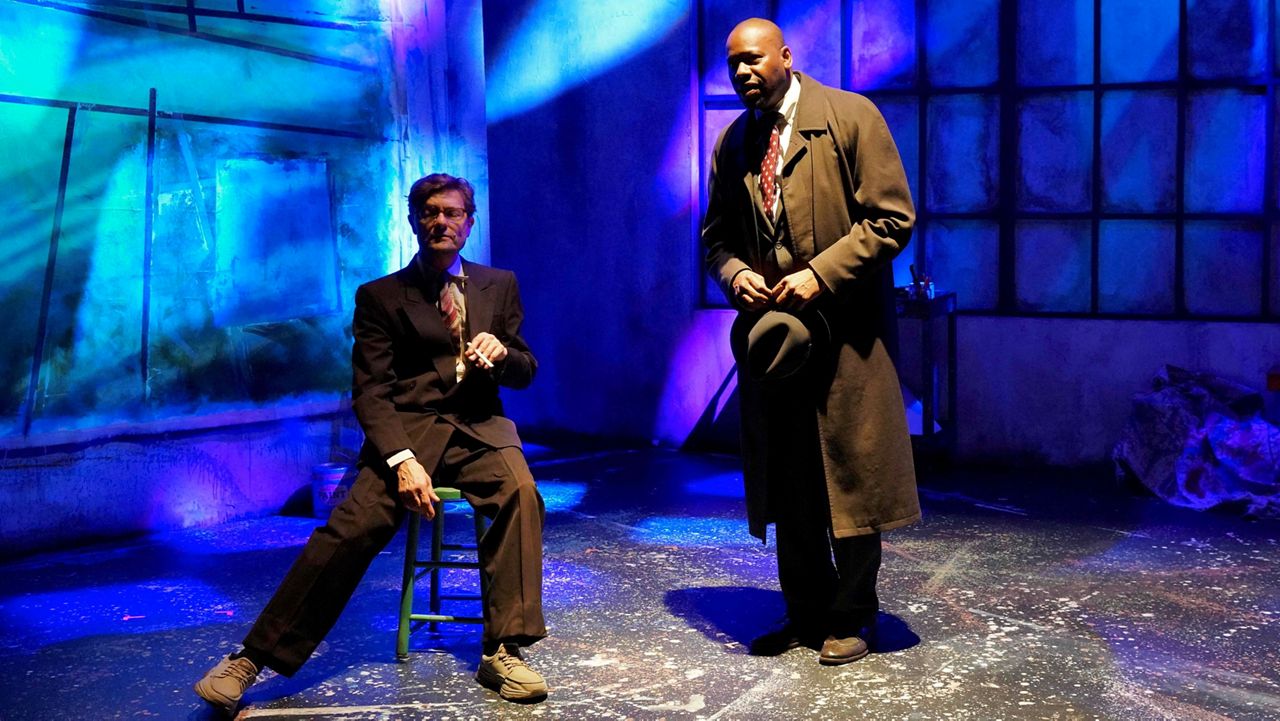LOS ANGELES — If the idea of the CIA secretly supporting avant-garde artists in the 1950s sounds too weird to be true, John Ross Bowie is here to tell you it happened.
“That is not something I made up,” he insisted. “That’s a real thing. That isn’t even a conspiracy theory.”
Bowie is best known as an actor and comedian, but his latest role is a playwright. His show “Brushstroke” is having its world premiere at the Odyssey Theatre.
It’s set during the Cold War and the stranger than fiction moment in U.S. history when the CIA fought communism with art — funding poetry journals, abstract expressionist artists and avant garde exhibits.
In a way, the CIA played the middleman between two inherently divided players: the conservative government in D.C. and the far left progressives of the New York art scene, who were mainly unaware of who was behind the funding and why.
“And I thought that was really, really interesting and a fun dynamic to play with,” Bowie said.
The show is a fictionalized account since most of the records on this operation have been destroyed.
“It’s the CIA,” Bowie said with a laugh. “You know, they’re surrounded by secrets.”
But what has been documented gave Bowie enough fodder to create a Cold War thriller that’s also a comedy. And how could it not be a comedy, he said, when in reality the U.S. government was dropping translations of T.S. Eliot into Russian airspace?
“Which is hilarious,” the playwright explained. “Poetry flying out of the sky in the 1950s Russia is the funniest thing I’ve ever heard, so I wanted to make sure we reflected that comedy, as well as discussing the ideas of what it means to be creative.”
The four person cast features some A-list talent, including Malcolm Barrett of “Timeless” and James Urbaniak, whose recent credits include a role in “Oppenheimer.”

The self-described history nerd admits he’s always been fascinated by the 1950s.
“So you have a sort of optimistic feeling. And then at the same time, you have this very intense paranoia,” he explained. “So there’s a divide there.”
“And I think there’s certainly a big divide in the country right now,” he added. “There is this sort of hyper partisanship. And I think there’s always some historical precedent to those sorts of dynamics.”
This is Urbaniak’s first time on stage in twelve years. He cut his teeth in theater, he said, and even co-founded an off-off-Broadway theater company in New York City in the early days of his career.
It was the kind of theater, he explained, that was “done for love,” and he’s thrilled to be rekindling that love in “Brushstroke.”
“There’s something just wonderful and unique about telling a story live in front of people that’s just different than the energy you get from a movie or TV,” he explained. “And I miss it. I don’t think I realized how much I missed it, so I’m really glad to be back doing a play.”
He’d never heard about this particular Cold War program and neither had Barrett, although he was hardly shocked.
Barrett plays a CIA agent who he describes as an optimist. It’s a role, he said, that was not written for a Black actor. The script contains a line about segregated lunch counters and during an early reading he said Bowie wondered if they should remove it.
“And I was like, ‘No. Why on earth would we take it out? You’re thinking about taking it out because it resonates,’” he explained. “It was very worthwhile to keep that sort of a language and to have this optimist be this Black patriot in the middle of 1956. There’s so many factors that go into this where if you do let your mind wander a little, it will be very uncomfortable and very relevant.”
In fact, Bowie said his play seems to be even more relevant now than when he wrote it in 2020.
“And unfortunately, it’s just getting more and more relevant as we head into an election cycle,” he explained. “We’ve had an increased sense of divisiveness in the country. It reminds me very much of the tone of discourse in the 1950s.”
As for his latest role, he’s grateful for the career that he’s made on screen, but said writing for theater allows for a different commentary and examination.
“We have a 99-seat house here,” he said of the space at the Odyssey, “so you get to be a little more specific, maybe a little more niche. And because you’re writing for a smaller audience, you don’t have to try to be something for everyone. And that’s really exciting.”



